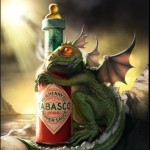Home Page › Forums › Fiction Writing › Genre-Writing › Fantasy › no such thing as magic
- This topic has 19 replies, 5 voices, and was last updated 8 years, 5 months ago by
 Kate Flournoy.
Kate Flournoy.
-
AuthorPosts
-
October 8, 2015 at 7:14 pm #6395
This has been very interesting for me! At first I was completely against, but I started looking into myself, and now I see your point. I mostly agree with you, I still think that there is magic, but that it is a MUCH narrower field than I previously thought.
Thank you for the discussion!The Scattered Writer
December 5, 2015 at 7:45 pm #7878Hey, Kate!
So *cough* you requested to know where I stand on magic-y stuff. Going in, I just want to say I understand where you are coming from and by no means am trying to insult anyone. *looks around* everybody clear on that? ‘kay.
Now, I see your example of a lightbulb at the beginning of the intro here. Point taken, but God did not take a stance against lightbulbs or invention. However, he did come down rather hard on magic, casting spells, witches and wizards.
It could be used in an allegory as “not really” magic. However that would be pretty confusing from a biblical point of view. You could use the magic as something bad that the hero needed to step away from, but even then, I’d personally not want to write that considering the research I’d be doing.
The LotR magic… I don’t know. It doesn’t quite set right, even if your calling it miracles. I mean, if the heroes are using the terms “magic” and “wizards”, aren’t they just calling it like it is? And if the author saw a problem with those terms, wouldn’t he just not use them?
Anyway, that’s where I am. Here are some blog posts that helped a lot for me as well:
http://matthewchristianharding.com/category/discernment/
All in the name of friendly debate. 🙂December 5, 2015 at 7:58 pm #7880Yes certainly! I love a good debate. So let’s both enjoy this thoroughly. This is just so fun. Really debate is so fun, and it so stretches our brains, and I love it…
So. Yes, you have good points there. I may be redundant in what I say, and say it all over again, but I hope not and if I am oh well. 😛
With LotR magic (I assume you’ve read that) if you analyze a magical character (let’s take Gandalf) deeply, you realize they’re not really a ‘magical’ character. Tolkien could have called him an angel or a prophet and still been accurate— both names are more accurate to what he really is than wizard. And not being Tolkien or ever having talked with him, I can’t tell you why he chose to call him a wizard. 😛 It may have been a way to help the reader connect better to his character— a wizard is on a slightly broader plane of relatability-ness, and certainly more human, than an angel.And in regards to spells, I think that would be the time when the creator of the world created a system of power that his servants could use, and that I might define as magic, but not bad magic, because the creator (the ‘good guy’) set it in place, and so it is not demonic. It is not a perversion of power. It is power, yes, and it is supernatural, but it is not twisted into darkness. Does that make any sense?
This is so fun. Thanks for taking me up, Rosey! 😀
The system of power thing could work, but I’d say that’s treading on dangerous ground. In the bible, there are the outright miracles, true. But usually the prophet or person seeking help prays to God, gets direct instructions and follows them. There aren’t any incantations or wand-waving and nothing that closely resembles the magic we see in a lot of fantasy.
Mostly what bugs me is that magic, in the bible, is portrayed as bad. And in a lot of books, people think that because it’s an imaginary world, they can pretend it would be good.
Would that work the same way for stealing, disrespecting parents or any other areas of the law?This is actually fun. 🙂
December 6, 2015 at 2:30 pm #7890Good points, Rosey. Of course this is fun!
Good points about magic too. 😛
You mentioned that magic in the Bible is portrayed as bad. Here’s a link to an article if you want to follow it, that discusses this issue very well, but in a nut shell, the magic mentioned in the Bible is witchcraft. Of course it’s portrayed as bad! Magic in the Bible is witchcraft— it’s bad because it is seeking to supplant God with some other power, which because there are only two powers— one of light, the other darkness— must necessarily be demonic and wicked.
But this whole topic has been about disproving ‘magic’ in that sense. ‘Magic’, in a fantasy world, is only that world’s echo of God’s power and Satan’s power. Does that make sense?And as to the wand-waving and incantations and all that stuff, it makes very little difference to me how one accesses or controls whatever power it is they have been given. You do have a point there, but I think that it’s where the power comes from that matters, not how you control the power. I wouldn’t care if it was controlled by you standing on top of the highest mountain in the world and singing ‘Row, row, row your boat’ backwards and in Pig Latin and at the very top of your voice.
Okay, maybe I would. That would be slightly incongruous. 😛
-
AuthorPosts
- You must be logged in to reply to this topic.


